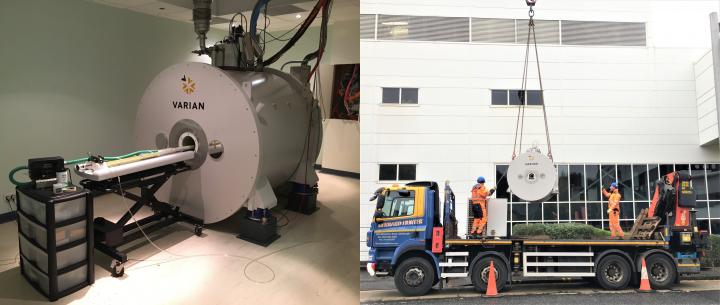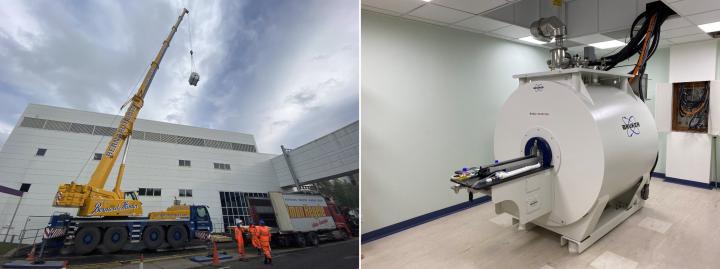New 9.4T magnet arrives in Edinburgh
£2.1M Investment in a new Bruker 9.4T Preclinical MRI Scanner Installation Complete
Over the past 3 years there has been a huge amount of work and investment advancing the preclinical MRI scanner capabilities at the Bioquarter Campus, University of Edinburgh. Our 14 year old, ageing and unsupported Agilent scanner has been upgraded in two phases. Firstly in summer 2018, the electronics were upgraded to the latest Bruker Biospec Neo console and then most recently we are excited to announce that our old Agilent 7T magnet has been replaced by a new Bruker 9.4T magnet. Following months of planning and after navigating our way through a slight delay due to COVID-19, we embarked on this extensive magnet replacement infrastructure project in October 2020 over a 5 week period. On Saturday 24th October the autumnal Scottish weather was amazingly kind to us enabling the project team to take the roof off the Chancellor’s Building, crane out the old magnet and successfully get the new magnet in position, which was no mean feat and the day went exactly according to plan!

This major investment in a new 9.4T Bruker Biospec AVANCE Neo MRI scanner, made possible by grants totalling £2.1M from the SIDB, BBSRC, Wellcome Trust and UKDRI, will bring many enhancements and advances to the pre-clinical MRI capabilities within Edinburgh Preclinical Imaging.
The new scanner is equipped with high performance gradients, multinuclear capability and a range of head and body coils. Brain coils will enhance high-resolution structural imaging (e.g. T1, T2, T2*, FLAIR) and wide-ranging specialist imaging techniques (diffusion tensor, perfusion, permeability and magnetisation transfer imaging, functional MRI, multinuclear spectroscopy, angiographic and flow quantification). Additionally we now have access to advanced protocols and software developments for cardiac imaging, whole body imaging and the study of other live organs and disease models across many animal species through their lifespan, along with the ability to scan a large variety of exvivo specimens.

The magnet field strength upgrade from 7T to 9.4T will also enable higher resolution imaging, better sensitivity, enhanced signal to noise, faster acquisition times and improved 1H-spectroscopy.
Furthermore, the applications, hardware and software support from Bruker, one of the worlds leading manufacturers of preclinical imaging systems, will continue to bring new opportunities to support the vast breadth of imaging research within CVS and across all other Centres within the College and the wider University, ensuring the long-term sustainability of the preclinical MRI facility into the future. Already, we are looking at options to accessorise our new MRI scanner further to meet the requirements for new multimodal imaging capabilities within the UKDRI – watch this space!
A huge thanks go to all stakeholders and everyone who has been involved in this project over the last few years from inception through to completion (of which there have been too many to mention individually!).

